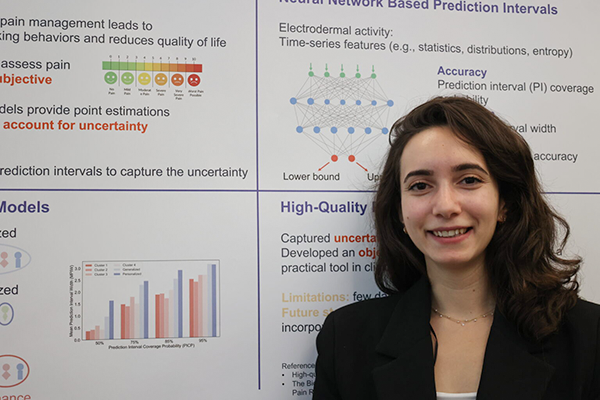PhD LEADERs Program Helps Alum Secure Multiple Job Offers and Shape Career Path

Burcu Özek, PhD’24, industrial engineering, credits Northeastern’s LEADERs program with helping her effectively communicate the value of her machine learning research in healthcare, leading to multiple job offers and ultimately guiding her career path.
She had multiple job offers before she’d even graduated. The hard part was whittling down to the best fit.
Burcu Özek, PhD ’24, industrial engineering, was one of the fortunate ones with job offers before she’d even graduated—from an industry startup, a hospital-university research collaborative, and academia in a coveted full-time faculty position. The hard part was whittling down to the best fit.
She could have told you anything about her work at the intersection of machine learning and healthcare. Her work in the lab (of Mechanical and Industrial Engineering Professor Sagar Kamarti) made her—like many PhD students—an expert. But what good was it if she couldn’t translate the value of her discoveries to those who knew nothing about it?
That’s where, in 2021, the PhD Network’s LEADERs program came in. In the flagship course, “Leading Self and Others,” Özek learned how to talk about the impact of her research, plain and simple: “We’re trying to develop machine learning models to objectively understand the level of pain of a patient, which would be especially useful for babies or patients in paralysis who can’t tell us how they feel,” says Özek. “Whenever any one of us goes to a hospital’s emergency room, doctors will ask us to self-report our pain level based on a chart with sad and happy faces, but that’s subjective to individuals with different pain levels.”
Relying on data collections of physiological signals, from skin conductance to muscle activity, her models predicted an objective estimated range of pain intensity that she hopes will one day be used in a hospital setting. “Without knowing the true level of pain, doctors can’t provide the correct treatment—like how many opioids they need to prescribe,” she adds.
In the LEADERs course, when she presented her research to PhD students outside her discipline, she says, “they responded with amazing questions that I had never thought about before. I saw the importance of collaborative interdisciplinary work. It taught me how to explain myself.”
Through LEADERs, she gained leadership and management tools and an understanding of her strengths and weaknesses. Upon completion, she was placed in a custom LEADERs fellowship with global healthcare company Merck, where she developed knowledge graphs to shed light on the relationship between genetics and adverse drug reactions. From her LEADERs mentor in the PhD Network and her mentor at Merck, she walked away with clarity about where she and her research fit into the world.
“At Merck, we collaborated a lot and that’s helped me to decide what I want to do in the future,” says Özek. She says finding her way came down to thinking like an engineer, using trial and error to gain from each experience along the way.
“I tried out different companies. I interviewed with them. I tried to learn their culture—how they care about collaboration and their academic work,” she says. “Ultimately, LEADERs helped me decide which industry I wanted to be in and what kind of work I wanted to do.”
In May, Özek graduated as one of a select group of engineering graduate students inducted into the newly established Lux. Veritas. Virtus. society, honoring graduate students who exemplify the university’s ideals and values. She accepted a position with a startup company whose “innovative use of artificial intelligence to address healthcare challenges aligns perfectly with my career goal of leveraging AI knowledge to improve people’s health.”
Upon completion of the “Leading Self and Others” course, LEADERs program staff and partner companies select fellows who align with specific industry needs. PhDs are supported through the fellowship application process and placed in a specialized role to solve a problem in industry. They go on to earn a LEADERs’ Experiential PhD leadership certificate, with guidance from an industry mentor and faculty advisor. The program is run by the PhD Network, which helps prepare students to enter the workforce as impactful researchers.
Source: PhD Network
By Anna Fiorentino, PhD Education